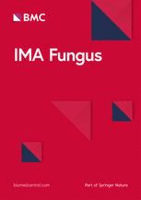
IMA Fungus
Scope & Guideline
Unveiling the Hidden World of Fungi.
Introduction
Aims and Scopes
- Integrative Taxonomy:
The journal emphasizes integrative approaches to fungal taxonomy, combining molecular, morphological, and ecological data to clarify species boundaries and relationships. - Fungal Pathogenicity and Ecology:
Research on the interactions between fungi and their hosts, including plant and animal pathogens, is a core focus, highlighting the ecological roles of fungi in various environments. - Genomic and Molecular Studies:
Studies involving genomic sequencing, phylogenetics, and molecular biology are prevalent, contributing to the understanding of fungal evolution and diversity. - Nomenclature and Classification:
The journal addresses issues related to fungal nomenclature and classification, providing a platform for proposals and discussions to standardize and improve taxonomic practices. - Fungal Biotechnology and Applications:
Research on the applications of fungi in biotechnology, including medicinal uses and bioremediation, showcases the practical significance of fungal studies.
Trending and Emerging
- Phylogenomic Studies:
An increasing trend in phylogenomic analyses is evident, showcasing the integration of genomic data to resolve complex taxonomic and evolutionary questions among fungi. - Artificial Intelligence in Mycology:
The application of artificial intelligence and machine learning techniques for species identification and data analysis is gaining traction, indicating a shift towards more innovative methodologies. - Environmental Adaptation Studies:
Research focusing on the adaptation of fungi to extreme environments, such as cold climates, is emerging, emphasizing the resilience and ecological significance of fungi. - Fungal-Vectored Pathogen Studies:
The role of fungi as vectors for other pathogens, particularly in ecological contexts, is increasingly recognized, highlighting the interconnectedness of fungal and environmental health. - Biodiversity and Conservation Efforts:
There is a growing emphasis on documenting fungal biodiversity and understanding its implications for conservation, reflecting global concerns about biodiversity loss.
Declining or Waning
- Traditional Medicinal Fungi:
Research on traditional uses of medicinal fungi appears to be waning, possibly due to a shift towards more modern and scientifically rigorous approaches to medicinal mycology. - Morphological Taxonomy:
There seems to be a decline in studies focusing solely on morphological descriptions of fungi, as integrative and molecular approaches gain prominence. - Generalized Fungal Ecology:
While specific ecological studies remain strong, broad ecological investigations that do not focus on specific interactions or applications are becoming less common.
Similar Journals

Botanical Studies
Cultivating a Community of Botanical InnovatorsBotanical Studies is a premier open-access journal published by Springer, dedicated to the field of botany and plant sciences. Since its establishment in 2006, the journal has championed innovative research and scholarship that explores diverse botanical topics ranging from plant systematics to ecology and conservation. With a commitment to broad accessibility, it promotes the dissemination of knowledge to researchers, professionals, and students worldwide. Botanical Studies fosters academic collaboration and dialogue, contributing significantly to the global botanical community. Its open-access policy allows unrestricted access to its high-quality, peer-reviewed content, ensuring that vital research is available to all. Join the growing community of scholars advancing botanical science through this essential publication, conveniently located at One New York Plaza, Suite 4600, New York, NY 10004, United States.

MYCOSCIENCE
Empowering Researchers with Cutting-Edge Mycological InsightsMYCOSCIENCE, published by the Mycological Society of Japan, is a prominent peer-reviewed journal that serves as an essential resource in the fields of ecology, evolution, behavior, and systematics, highlighted by its Q2 ranking in the 2023 category quartiles. Established in 1994 and continuing through 2024, the journal focuses on mycological research, providing insights into the interconnected worlds of fungi and their ecological roles. With an ISSN of 1340-3540 and an E-ISSN of 1618-2545, MYCOSCIENCE aims to disseminate high-quality research that addresses current issues and trends within the discipline. Despite not being an open-access journal, it makes a significant contribution to advancing fungal biology and its applications in agriculture and environmental science, making it an invaluable asset for researchers, professionals, and students alike. Located in the vibrant academic environment of Tokyo, Japan, MYCOSCIENCE stands out for its dedication to fostering a deeper understanding of mycology and its implications for biodiversity and ecosystem health.
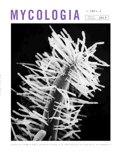
MYCOLOGIA
Exploring the intricate world of fungi and their ecosystems.MYCOLOGIA, published by Taylor & Francis Inc, is a prestigious journal that has been at the forefront of fungal research since its inception, with converging years of publication from 1945 to 2024. This interdisciplinary journal, identified by ISSN 0027-5514 and E-ISSN 1557-2536, stands out in various scientific categories, achieving Q1 rankings in Ecology, Evolution, Behavior and Systematics, as well as Plant Science, alongside strong performances in Cell Biology and Molecular Biology categories. With an impact factor that reflects its significance in the field, MYCOLOGIA appeals to a diverse audience, including researchers, professionals, and students dedicated to advancing the understanding of fungal biology and its ecological implications. Notably, while it does not currently operate under an Open Access model, the journal remains a vital resource for those pursuing groundbreaking discoveries in mycology and related disciplines.
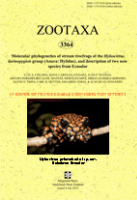
Zootaxa
Exploring the depths of animal science and systematics.Zootaxa is a prestigious peer-reviewed journal dedicated to the rapid publication of new taxa and biodiversity research in the fields of Animal Science and Zoology as well as Ecology, Evolution, Behavior, and Systematics. Published by Magnolia Press in New Zealand since 2005, this journal holds a significant position within the academic community, holding a Q2 ranking in key categories as of 2023. With an ISSN of 1175-5326 and E-ISSN of 1175-5334, Zootaxa is indexed in Scopus, reflecting its impact and relevance in contemporary research. While it operates under a subscription model, the journal remains committed to advancing the understanding of biodiversity and the systematic classification of organisms. Researchers, professionals, and students can rely on Zootaxa for high-quality research that contributes to the ongoing dialogue in taxonomy and ecological studies, as it aims to foster collaboration and knowledge sharing among scientists globally.

BIOLOGIA
Advancing biological knowledge across diverse disciplines.BIOLOGIA, a distinguished journal published by Springer, serves as a pivotal resource in the fields of biological sciences, including Animal Science, Zoology, Plant Science, Ecology, Evolution, Behavior, Cell Biology, Biochemistry, and Genetics. Established in 1954 and continuously disseminating knowledge through its converged years until 2024, it supports the academic community by fostering effective communication amongst researchers and professionals. Notably, the journal boasts a commendable presence in academic rankings, holding a Q2 ranking in Animal Science and Zoology, along with Q3 designations in multiple disciplines, reflecting its substantial impact in enhancing scientific inquiry. While currently not offering open access, the journal remains a critical tool for those seeking to stay at the forefront of biological research, supported by its robust publication framework. For students, researchers, and professionals alike, BIOLOGIA is an essential reference for innovative studies and findings that drive the field forward.
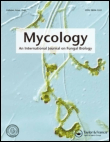
Mycology-An International Journal On Fungal Biology
Innovating Insights into Fungal ScienceMycology: An International Journal on Fungal Biology, published by Taylor & Francis Ltd, stands at the forefront of fungal research, facilitating the dissemination of knowledge across the diverse fields of infectious diseases, microbiology, and plant science. Established as an Open Access journal since 2010, it offers researchers free and immediate access to high-quality articles that advance our understanding of fungal biology and its applications. With a commendable ranking in Q2 for Infectious Diseases and Microbiology, and Q1 for Plant Science as of 2023, it positions itself as a vital resource for the global scientific community. The journal, conveniently located in the United Kingdom, is committed to publishing rigorous research that stimulates discussion and fosters collaboration among academics, practitioners, and students alike. By providing a platform for innovative studies and critical reviews, Mycology continues to play an essential role in unraveling the complexities of fungal organisms and their profound implications in health, agriculture, and ecosystem dynamics.

FUNGAL DIVERSITY
Unveiling Nature's Hidden Kingdom: Fungal InsightsFungal Diversity is a premier academic journal dedicated to advancing the science of mycology, encompassing ecological, evolutionary, and biological research involving fungi. Published by Springer, this journal has established a significant presence in the academic community since its inception in 1998, and it continues to thrive with a convergence period extending to 2024. Holding a prestigious Q1 ranking in several categories — including Ecology, Ecology, Evolution, Behavior and Systematics, and Plant Science — Fungal Diversity showcases cutting-edge research that influences ecological management, conservation, and biodiversity studies. With its notable positions in Scopus rankings, including being ranked #1 in Environmental Science - Ecology, the journal serves as an essential resource for researchers, professionals, and students interested in the complex interplay between fungi and their environments. Although it does not currently offer open access, interested readers can benefit from the journal's rich repository of peer-reviewed articles, making Fungal Diversity a vital component of the scientific literature landscape.

Frontiers in Fungal Biology
Exploring the Hidden World of FungiFrontiers in Fungal Biology is an innovative academic journal dedicated to advancing the field of mycology and its interdisciplinary connections, published by FRONTIERS MEDIA SA. With an E-ISSN of 2673-6128, this journal focuses on exploring diverse aspects of fungal biology, including ecological roles, evolutionary processes, and interactions with other organisms. Since its inception in 2020, Frontiers in Fungal Biology has garnered attention within the scientific community, earning a commendable Q2 ranking in both Ecology, Evolution, Behavior and Systematics, and Environmental Science categories in 2023, alongside respectable Q3 rankings in Infectious Diseases and Microbiology. The journal is committed to open access principles, making cutting-edge research freely available to a global audience, promoting knowledge sharing and collaboration. By providing a platform for rigorous research and impactful discussions, Frontiers in Fungal Biology aims to enhance the understanding of fungi and their significant roles in ecosystems, health, and biotechnology, appealing to researchers, professionals, and students alike.

Vertebrate Zoology
Bridging Science and Discovery in Vertebrate ZoologyVertebrate Zoology is a prestigious open-access journal published by the Staatliches Museum Tierkunde Dresden in Germany, focusing on the intricate and diverse field of animal biology. With an ISSN of 1864-5755, the journal has established itself as a vital resource for researchers, professionals, and students in the realms of Animal Science and Ecology, Evolution, Behavior, and Systematics. Since transitioning to open access in 2021, it has expanded accessibility and global dissemination of research findings, showcasing significant studies that contribute to our understanding of vertebrate fauna. The journal's impressive Q1 quartile rankings in both Animal Science and Zoology, as well as Ecology and Evolution, underscore its influence within the academic community—ranking #95 and #220 in their respective categories according to Scopus. Spanning from 2011 to 2024, Vertebrate Zoology aims to provide a comprehensive platform for innovative research, fostering collaboration and advancing knowledge across the biological sciences.
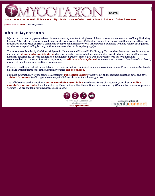
MYCOTAXON
Unveiling the Secrets of Fungal EcologyMYCOTAXON is a peer-reviewed journal dedicated to the field of mycology, focusing on the taxonomy, systematics, and ecology of fungi. Published by MYCOTAXON LTD, this journal plays a crucial role in advancing our understanding of fungal biodiversity and its significance within various ecosystems. Although it currently does not offer open access options, its contributions are vital to the scientific community, especially with its established presence since 1989. With an HIndex reflecting its relevance and attracting a dedicated readership, MYCOTAXON is recognized within the Q4 quartile in both Ecology, Evolution, Behavior, and Systematics, and Plant Science categories as of 2023. This places it among a critical cohort of journals that contribute to the understanding of ecological dynamics and plant-fungal interactions. Researchers, professionals, and students can benefit from the insights provided in MYCOTAXON, making it an indispensable resource for anyone involved in the study of fungi.